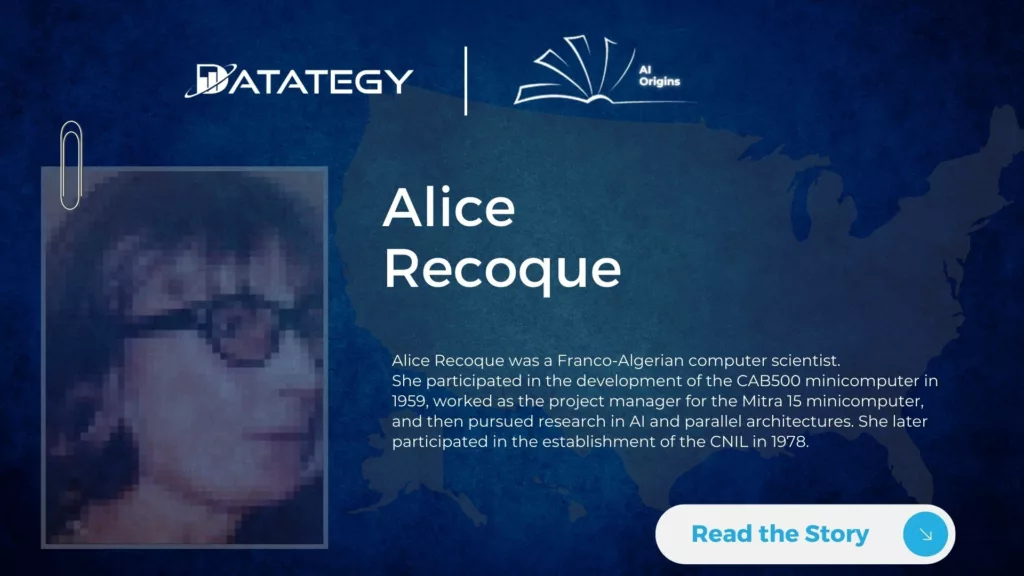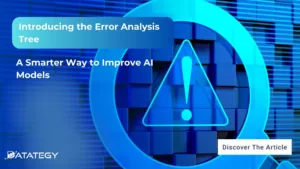Scaling RAG Systems in Financial Organizations Artificial intelligence has emerged...
Read MoreAI Origins: Alice Recoque
Table of Contents
ToggleWelcome to ”AI Origins “ series. In this collection of articles, we take you on an inspiring journey through the history of artificial intelligence, focusing on the remarkable individuals who have played a crucial role in making AI accessible to everyone.
Throughout these articles, we’ll dive into the life stories and contributions of these innovative minds who have reshaped the AI landscape, paving the way for a more inclusive and transformative future. Join us as we celebrate the human ingenuity behind the AI revolution and explore the extraordinary individuals who have made it all possible.

Alice Recoque is a leading figure in artificial intelligence (AI), renowned for her pioneering contributions to computing and information processing systems. Born in Algeria, her innovative work has played a pivotal role in the evolution of modern computing technologies. With a wealth of experience and expertise in AI research, she continues to spearhead groundbreaking initiatives, shaping the trajectory of AI and machine learning. Recoque’s dedication to advancing the frontiers of AI has established her as a prominent influencer, driving innovation and transformative change in the field.
Key Dates about Alice Recoque
| Date | Event |
|---|---|
| August 29, 1929 | Born in Cherchell, Algeria |
| 1954 | Graduated from ESPCI Paris - PSL |
| 1959 | Participated in the development of the CAB500 minicomputer |
| 1960 | Became project manager for the Mitra 15 minicomputer |
| 1978 | Contributed to the creation of the CNIL |
| January 28, 2021 | Passed away in Ballainvilliers, Essonne, France |
Alice Recoque's role in CAB500 and Mitra computer
Alice Recoque was a pioneering figure in the field of computer science, known for her significant contributions to the development of early computing systems in France. One of her notable achievements was her work on CAB500 minicomputer during the late 1950s and early 1960s.
CAB500, developed under the direction of André Richard and François-Henri Raymond at the Société d’Électronique et d’Automatisme (SEA), was one of the first conversational desktop computers. Recoque’s expertise in computer architecture was instrumental in designing a system that balanced performance with affordability, making complex scientific calculations more accessible.
The CAB500’s innovative architecture provided reliable performance for complex calculations and data processing, making it a versatile tool for various applications, from business management to scientific research. Its user-friendly design reduced the need for specialized training, broadening its accessibility. The compact size and portability of the CAB500 allowed for easier installation in diverse environments, from corporate offices to research labs.
After her work on the CAB500, Alice Recoque continued to make significant strides in computing technology. She played a crucial role in the development of Mitra computer series at the Compagnie Internationale pour l’Informatique (CII) during the 1970s. Mitra computers were among the first minicomputers in France, designed to compete with contemporary systems like the DEC PDP-11. Mitra 15, launched in 1972, was particularly successful, known for its performance, robustness, and adaptability to a wide range of applications.
Alice Recoque’s contributions to CAB500 and Mitra computer series laid the groundwork for future advancements in computer architecture, influencing the design of subsequent minicomputers and mainframes.
Benefits of CAB500 and Mitra computer
| Benefit | Description |
|---|---|
| Compact Size and Portability | Smaller than mainframes, easy to install in various environments such as offices and labs. |
| Cost Efficiency | More affordable than mainframes, making computing accessible to smaller businesses and institutions. |
| Improved Performance | Reliable and efficient for complex calculations and data processing tasks. |
| User-Friendly Design | Simplified operation and maintenance, reducing the need for specialized training. |
| Versatility | Suitable for diverse applications, including business, research, and technical calculations. |
| Innovation in Architecture | Introduced new architectural concepts, influencing the development of future minicomputers. |
Interested in discovering papAI?
Our AI expert team is at your disposal for any questions
How AgenticAI is Transforming Sales and Marketing Strategies
How AgenticAI is Transforming Sales and Marketing Strategies Agentic AI...
Read More“DATATEGY EARLY CAREERS PROGRAM” With Abdelmoumen ATMANI
“DATATEGY EARLY CAREERS PROGRAM” With Abdelmoumen ATMANI Hello, my name...
Read MoreIntroducing the Error Analysis Tree: A Smarter Way to Improve AI Models
Introducing the Error Analysis Tree: A Smarter Way to Improve...
Read More


